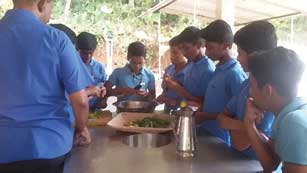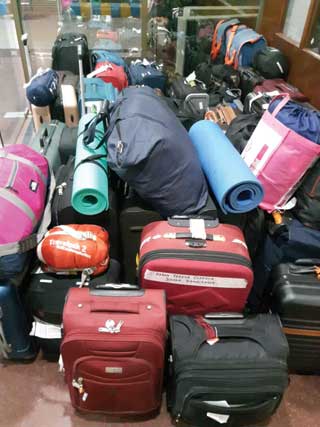Neha Pradhan Arora
When I was 14 and had to choose my 6th subject as part of the ICSE curriculum I was studying, the choice was between home science and economics. In my understanding then, home science was a subject that included cooking and stitching – both skills I did not have much interest in. I saw my batchmates choose the subject for various reasons ranging from interest to ability to desire to take up a subject that was considered ‘more scoring’.

The curriculum then consisted of various aspects of home and family management. When I shared hostel space with undergraduate and postgraduate students of home science, I realized that the subject does build a foundation for specialized higher education in diverse disciplines ranging from human behaviour and psychology to textile design and fashion design to nutrition and others. However, the term home science in itself is misleading. The perception that the subject is needed to manage a home and family continues to be the primary view. Boys’ schools usually do not offer it as a subject. In co-ed schools, it is mostly girls who enrol for the subject. While this is slowly changing, it is still considered primarily a subject for girls or women. In fact, the goal of the Home Science Association of India is stated categorically on their website. “The Home Science Education in India started during early 1940s with goals set to wipe out mass illiteracy among women and teach them to take care of their family’s health and nutrition, clothing construction and raise their families in a meaningful manner.”*
On the other hand, when I visited schools in Finland, I was impressed by the compulsory subject home economics for 12 to 16 year-olds. I saw students cleaning the kitchen (lab) on the last day of school and others designing and stitching a dress for themselves while having learnt other day-to-day tasks or skills for managing their own lives and homes in a sustainable and independent manner. This was part of the curricular change in 2016 in Finland.
It got me thinking about what skills do boys and girls need today to manage their own homes and lives when they begin to live independently. It got me thinking about what I had needed and learned on my own more than 20 years ago, when I moved to study and lived in a hostel. Amongst other skills, these included –
• Finding my way around in a new place – I always got a physical map first!
• Space management skills – how to fit more things into small spaces (suitcases, bags, cupboards, drawers, et al).
• Financial management – managing my expenses – my needs (mess bills, phone bills, stationery, photo copies of notes, etc.) and my wants (pizzas, movies, outings, gifts, etc.) – in my monthly allowance.
• Banking – understanding the system and making payments on my own (cheques, deposit slips, withdrawal slips, passbooks and the like).
• Self-care – what to eat or do to stay well and healthy.
When I started working and began to live in a house by myself, I realized there is more to managing a house. Now the skills included –
• Knowing how to cook a meal.
• Knowing how to shop and get necessary ingredients before deciding to cook a meal.
• Managing someone who helps with washing and cleaning.
• Communicating and dealing with all those whose services support me.
• Making the space mine – aesthetically and functionally.

All the others continued with a big focus being on financial management – How much should I save? How should I save? Where should I save? Self-care continued to be a struggle. I didn’t know how to do simple repairs around the house or manage too many gadgets. I could repair a tear or sew a button but couldn’t change a bulb. I also didn’t know how to change the gas cylinder.
Today as a 40+ year old woman, I am managing my home, my work, my family and my finances. And I’m using a lot of new skills to do the same. So what does it take to manage one’s home and life, independently and sustainably?
• The ability to cook oneself nutritious, balanced meals (not just maggi or cup-o-noodles).
• Self-care for the mind, body, heart and soul with a balanced routine of sleep, exercise, meditation/yoga and healthy interactions with loved ones.
• The knowledge of the relevance of sustainable and non-chemical alternatives for groceries, toiletries and other supplies and how and where to get them.
• The ability to budget and plan the resources for consumption in a sustainable manner (reduce wastage and unnecessary consumption).
• Digital citizenship through safe and responsible use of social media, email and other platforms.
• Tech-friendliness and the ability to approach a new gadget without fear.
• Banking and making financial transactions using the internet or other methods.
• Financial independence and intelligence to be able to save and invest in an effective manner.
• The ability to drive or organize transport for oneself.
• The ability to respond to simple medical emergencies.
Many of these skills are a part of the 21st century skills or the life skills that also include social and emotional skills for individuals to survive and thrive in the world. The reason I am listing these out is to help us question and relook the following –
• What do self and home management mean today – what skills do they need? Who needs these skills?
• What skills of home management have been outsourced and hence do not need to be learnt by everyone?
• What skills are now critical and hence need to be taught and learnt by young people?
• When and where should these be taught or learnt?
• What should these skills be called and taught as?
Across the world, perception about this subject, its relevance and its practice is slowly changing. The Swedish model is similar to the Finnish one. Estonia has a subject which combines home economics with a craft. America has a subject called family education and consumer awareness. Family training and welfare, family studies, family science, food and nutrition, hospitality … these are some of the terms used over the years in different countries. In India, we have called it home science since it began about a hundred years ago and it is offered at the school and university level.
In India, the draft National Policy for Women, 2017 proposed that the HRD Ministry redesign school curriculum to promote gender sensitivity as well as make home science and physical education compulsory for both girls and boys. We have also had SUPW, Work Education as subjects at different times to help some of these skills.
I bring back the same questions and invite you to reflect on these as an educator, a parent, a young person and think of what skills are needed by everyone to manage their lives and homes independently and sustainably?
• What does self and home management today – what skills does it need? Who needs these skills?
• What skills of home management have been outsourced and hence do not need to be learnt by everyone?
• What skills are now critical and hence need to be taught and learnt by young people?
• When and where should these be taught or learnt?
• What should these skills be called and taught as?
To me it is very clear that the skills needed to manage one self and one’s home are critical for everyone – boys or girls, young or not so young! If anything, the last year of lockdown in a global pandemic has taught us that. The question now is how do we then package these skills into one group/subject/discipline and ensure that it becomes a part of the learning for every child? Would it help to change the name? Would it help to make it a compulsory subject for middle school? How do we ensure that the curriculum in this subject remains dynamic and relevant and does not remain stuck at an ideal framed in the previous century?

The Position Paper on Work and Education (2007, NCERT) states clearly that stereotypes and biases in roles and work violate the basic principles enshrined in the Constitution. Nor do they promote a democratic, egalitarian, secular and enlightened society. Hence, the suggested typology for the curriculum has the first section as ‘Integral to daily living’ and consists of the following –
- Sweeping and Scavenging; Making of brooms, mops and scoops
- Health, hygiene and sanitation
- Cooking, nutrition and serving
- Processing of foods, spices, and other food ingredients
- Laundry and preparation of soaps and detergents
- Tailoring, stitching, embroidery and knitting
- Care during pregnancy and early childhood care
- Interacting with the disabled, infirm and the sick
- Old age care
- Repair and maintenance of household gadgets
- Preparation of cosmetics, aromatics and herbal medicines
- Saving of water, electricity and fuel consumption
- Sharing of household responsibilities
- Domestic budgeting and planning.
While some of this may not seem contextual as necessary skills for all children, it definitely emphasizes the need to bring into our classrooms the skills that are critical for daily functioning for everyone, everywhere. The paper goes on to list other areas of work education like habitat and shelter, agriculture, transport, textiles, tools and machines, services, health and sports, community work and social action with smaller units of study. NEP 2020 is also bringing the focus back on developing competencies with contextual knowledge and critical skills and this may then be the right time to redefine what we consider critical skills for daily living and integrating them into our curriculum and practice, beyond the narrow definition of home science as it is today.
*https://www.homescienceassociationofindia.com/goals_and_objectives
Other sources –
• https://www.hindustantimes.com/education/gender-sensitivity-wcd-proposes-mandatory-home-science-for-boys-in-school/story-iY5LfXraFzCaP20hzzBNQO.html
• https://www2.helsinki.fi/en/news/education-news/cooperation-skills-are-at-the-core-of-finnish-home-economics-teaching
The author is a creative and passionate educator and has worked in the education and development sector for over 15 years with a focus on building capacities of young people and teachers. She works with schools across the country to help strengthen the teaching-learning environment through dialogue and learning experiences. She can be reached at neha.learningcommunities@gmail.com.
